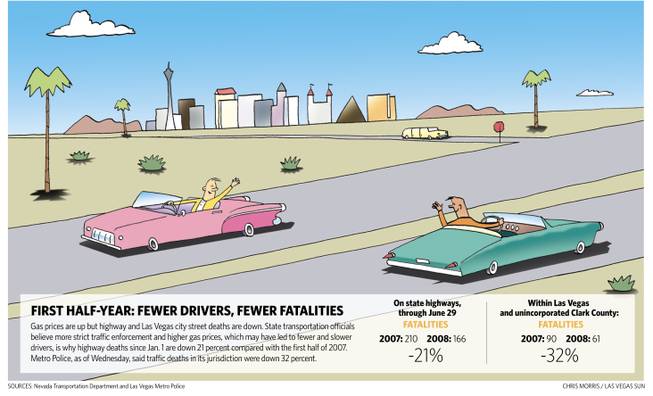Tuesday, July 1, 2008 | 2 a.m.
Reader poll
Sun Archives
- When a gallon of gas is not exactly a gallon (6-30-2008)
- Gas 'peakers' set to kick in when weather sizzles (5-19-2008)
Beyond the Sun
The high cost of gasoline may be killing the economy, but it also may be saving lives.
Fewer drivers are using state highways, and fewer people are dying on those roads.
In May, just about the time gas hit $4, the state Transportation Department’s traffic counts at 21 sites in Clark County were down 6 percent overall compared with the May 2007 counts. Only three of the sites posted traffic increases, and at an average of about 1 percent.
“When you’ve seen this report ... over last 10 to 20 years, it’s been consistent increases every year,” said DOT spokesman Scott Magruder. “We had even seen the tripling of traffic on some roads over a period of 10 years. So any reduction not attributed to a new road or highway is very significant.”
Over roughly the first half of this year, the number of deaths on the highways and city roads has declined dramatically since early 2007.
As of June 22, Metro had seen a 32 percent drop in traffic fatalities, 61 since Jan. 1, compared with 90 in the same period of 2007.
As of June 29, the number of highway traffic deaths was down 21 percent for the year — 166 compared with 210 for the same period last year, according to state Transportation Department statistics.
“Definitely one of the contributing factors has to be fewer cars and trucks on the road,” Magruder said.
The drop in deaths is “huge,” but it may be as attributable to increased law enforcement as anything else, said Valerie Evans, program manager of Joining Forces, a Nevada Department of Public Safety program that uses federal money to pay overtime costs for enforcement of traffic laws.
She noted that Nevada’s annual highway death toll dropped 15 percent from 2006 to 2007.
Metro Police Sgt. Oscar Chavez thinks along the same lines. Chavez, of Metro’s traffic administration section, said although “gas prices have to be a part of it,” he’d “hate to think” the only reason traffic fatalities are down is less driving as a reaction to higher gas prices. He said Sheriff Doug Gillespie has made traffic safety a priority for his department.
Still, no one denies prices at the pump are prompting many people to change their driving habits. Just ask Rico Bergeron, a 28-year-old concrete worker from Louisiana.
“I used to go all over the place to see friends, take my kids places,” he said while filling his pickup truck with $4.23-a-gallon regular last week at a Chevron station on Sahara Boulevard and Maryland Parkway. “I can’t do that anymore. It’s too expensive. I have to survive.”
In addition to driving less, some motorists are slowing down. More people apparently are latching on to the idea that they can get better gas mileage from lower speeds.
Slower traffic can also mean fewer citations. USA Today reported last week that 13 of 20 states surveyed — including Nevada — reported a decrease in traffic citations issued by state troopers over the first five months of this year.
Despite fewer drivers, Magruder doesn’t expect state transportation planners, grappling with skyrocketing traffic volumes for years, to stop fretting about traffic congestion.
Road construction costs are increasing because a key component of asphalt is oil.
And ironically, a continued downturn in the number of drivers on state highways might actually lead to more urgency in the quest to find money for roads. That’s because gas tax revenue helps pay for construction and improvement of state highways — and gas tax revenue is headed down for the first time in at least seven years.
As of June 23, state gas tax revenue for 2008 was down 0.4 percent compared with the same period of the prior year, a drop of about $600,000.
But that’s just for gasoline. Diesel fuel tax revenues have fallen by much more. By this time in 2007, the state had collected $79.02 million in taxes on diesel fuel. For the same period this year, the total is about 10 percent less, $71.18 million.
For both categories of fuel tax, the state blames the economy’s effect on drivers.
More people are switching to more energy-efficient vehicles or cutting back on their driving so they can reduce the amount of gasoline they have to buy. Or they simply can’t afford to buy as much gasoline as they used to.
The larger drop in diesel sales also was likely compounded by the hit taken by the housing market and the overall decline in sales across the state, officials said.
“There are fewer building suppliers trucking into Nevada,” Magruder said. “We’ve also seen sales tax revenues declines, which mean fewer goods are being delivered here with heavy trucks that use diesel fuel.”
The smaller number of trucks on the road is probably helping to reduce the number of traffic accidents as well, Magruder figures. “When you see a reduction in volumes of traffic, that is going to be a contributing factor in the reduction of accidents and fatalities.”
Trooper Kevin Honea, Nevada Highway Patrol spokesman, doesn’t doubt that the decrease in drivers, as a reaction to costly gas, has meant fewer traffic fatalities. But he won’t take credit away from better enforcement and the fact that perhaps, just perhaps, Nevada drivers are beginning to get it.
“We do education, advertising, enforcement,” Honea said. “But the bottom line is, none of this is even possible without the drivers themselves taking notice and simply driving more safely.”


Join the Discussion:
Check this out for a full explanation of our conversion to the LiveFyre commenting system and instructions on how to sign up for an account.
Full comments policy